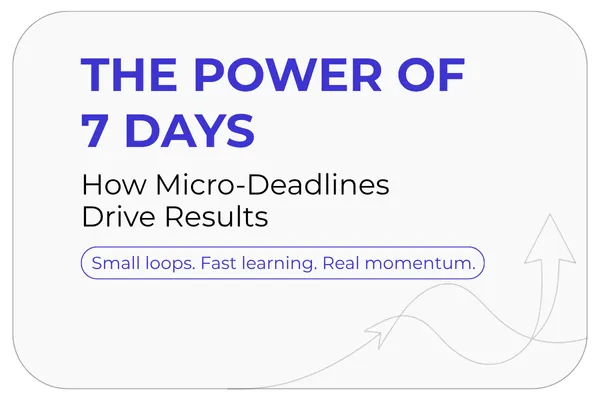
The Power of 7 Days — How Micro‑Deadlines Unlock Big Outcomes
Why 7 Days
A week is near enough to feel and far enough to matter. It asks better questions. Not “What could we do?” but “What will we finish?” Seven days punish fantasy and reward movement. When time is short, excuses become heavy and evidence becomes light.
Containers Create Honesty
Projects expand to the size of the container that holds them. If the container is a quarter, the scope will bloat until it fills three months and your appetite for change. A 7‑day container flips the logic: time is fixed, scope is flexible. You discover the smallest system that still changes behavior.
Fix the time (Friday demo on camera).
Flex the scope (cut anything that doesn’t touch the outcome).
Protect the signal (instrument early so you can see change).
This is not a productivity trick. It’s a way of making reality visible sooner.
Cadence in Practice
Monday — Choose three NBAs. Define the demo: what will we show that proves movement?
Tuesday — Build the smallest shippable system (router tweak, offer clarity, onboarding nudge).
Wednesday — Ship and verify tracking (UTMs, tags, intent labels).
Thursday — Observe outputs; prepare one decision.
Friday — Demo, decide, write one sentence about next week’s change.
Friday demo prompt: “Here is the evidence, the lever we pulled, and what we’ll change on Monday.”
Micro‑Deadlines, Macro Effects
Micro‑deadlines don’t make work smaller; they make progress legible. Teams that move weekly don’t argue about hypotheticals because the loop answers quickly:
Did the first click shorten the path?
Did routing reduce drop‑offs?
Did the aha moment arrive faster?
You won’t get all three at once. But you will know what moved — and what to try next.
Pitfalls (and Simple Fixes)
Over‑scoping. Fix: Start with a version that fits in two days; improve after evidence.
No instrumentation. Fix: Add UTMs and intent tags before polish; guessing is the most expensive step.
Endless mid‑week meetings. Fix: Protect the build window (Tue–Thu). Meet briefly; decide on Friday.
Multiple tests at once. Fix: One test, one number. Split attention is not speed.
A Small Story (Composite)
A three‑person team planned a quarter of “foundational work.” Four weeks later, nothing they could show. They switched to 7‑day loops and cut the scope to three NBAs:
Normalize inbound leads and route by intent.
Add a first‑aha checklist to onboarding.
Rewrite the one‑page offer to match top intent.
By the second Friday, time‑to‑route dropped to under two minutes; first‑aha time fell by 28%. No heroics. Just smaller systems, finished sooner.
What to Do Next (Pick Your Path)
Open the Picker → We’ll map you to the fastest path (Book, $97 Challenge, or Toolkits).
Try the 7‑Day Challenge →Daily tasks; your $97 becomes credit toward a Toolkit.
Get the AI Business Growth Toolkit → Routers, scorecards, test matrices, and done‑for‑you blueprints.
Read the Book →A deeper dive into the weekly operating system that ships outcomes.

